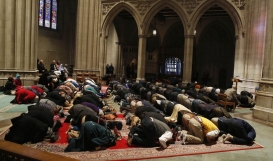Famous atheists and countless memes all over the internet declare it: religion is the root of all evil. It's claimed to be the cause of war and violence, the oppression of minorities, and many other acts of wrongdoing. Indeed, some of the most difficult threats and conflicts of recent years have had a religious flavour, so is there any truth to these claims?
I don't think so. In fact, I believe that Christ is ultimately the answer to the world's problems. But how do we discuss the issue with those who genuinely can't see faith as more than the cause of suicide bombings and the Inquisition? Here are five ideas.
1. Such claims are too vague.
It's possible to attribute the problems of the world to many vague and non-specific categories. Yet we don't find many memes or best-selling books claiming "politics is not great", despite its role in most major conflicts.
For example, some of the worst mass killings of the last 100 years were committed by atheistic communists. Yet rarely are there protests against communism, socialism, the Labour Party, atheism, or 'politics' – though all have links (however tenuous) to Stalinism. Horrors such as eugenics and genocide can sometimes be traced to ideas within science and philosophy. Should we dismiss all science, philosophy, politics and religion?
To really investigate the issues, you have to get specific. Religions and their various sects are all very different, as are wars and other acts of oppression and violence.
2. The facts show religion isn't usually the cause of conflict.
In one encyclopaedia of war, only 7 per cent were classed as religious in nature, according to CARM. Supposedly 'religious' conflicts such as the Troubles in Northern Ireland have intertwined cultural, political and socio-economic causes. In general, wars past and present do not usually have religion as the primary motivator, academics say. Meic Pearse, a professor of History, argues in The Gods of War that irreligion has actually been more harmful than religion.
It's true that some of the commonly cited evils done in the name of Christianity are an embarrassment to the faith, but the rhetoric rarely matches the reality. For example, the Catholic Church is frequently criticised for its role in the Second World War. But this ignores the many priests who hid Jews, openly challenged the policies of Hitler, and some of the positive influence that Pope Pius XII had – as the late holocaust historian Sir Martin Gilbert argues.
3. It's impossible to measure, in any case.
It is difficult to find a logical, empirical approach to measuring how much good or bad is caused by a category as broad as religion. To be able assess statements such as "religion does more harm than good", you would have to somehow measure every bad action that's been done in the name of God and/or inspired by religion. You'd also have to quantify every good action: every hospital built, every school started, every good deed. Somehow you'd have to weigh up how much good or bad all of these things did, then assess whether religion really was the motivator of this action, differentiate between the various kinds of faith, then compare. This is pretty much impossible.
4. What's your own experience?
Digging out facts and historical research is helpful, but it's worth thinking about personal examples. Has our own faith led to positive actions? What about the lives of the people we know? If someone is presenting you with all the perceived ills of Christianity, it's an opportunity to talk about the good things your faith has brought to you and the people around you.
Without faith in Christ, there would be many drug addicts still robbing to feed their habit, many people with emotional problems still weighed down with pain, many villages and towns without missionaries and therefore medical care.
It's also worth investigating the incredibly positive influence many Christians have made to the world. Reading the writings of some of the great reformers – Lord Shaftesbury, Josephine Butler, Martin Luther King, and William Wilberforce – reveals how their faith in Christ influenced them for good.
5. Getting to the fundamentals.
If we're going to look at the contribution that various religions and their sects make towards our world, we have to examine what they teach – what the fundamentals are – and whether the good and evil done in the name of that religion is in alignment with those ideas.
However, many people think that a passionate adherence to a religion's fundamentals is always a bad thing. Usually 'religious fundamentalist' is effectively used as a synonym for 'unpleasant person'.
But I don't think a true 'Christian fundamentalist' should be so. I think Jesus' fundamentals were pretty clear: love God with everything we have and love our neighbour. He stressed repentance from sin, belief in him, and following his commands. Finally, in the Last Supper, he focused on his sacrifice for the forgiveness of many. What happens when these truths are our own fundamentals? Does this bring good to the world? Perhaps we've got to demonstrate this to the people we meet, with our own lives and our actions.

















